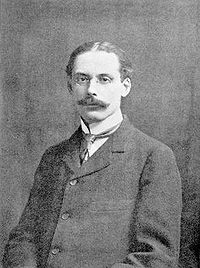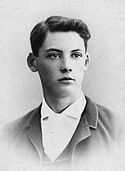- Edwin Arlington Robinson
-
Edwin Arlington Robinson 
Born December 22, 1869
Head Tide (Alna), Lincoln County, MaineDied April 6, 1935 (aged 65)
New York City[1]Occupation Poet and playwright Nationality American Spouse(s) none Edwin Arlington Robinson (December 22, 1869 – April 6, 1935) was an American poet who won three Pulitzer Prizes for his work.
Contents
Biography
Robinson was born in Head Tide, Lincoln County, Maine, but his family moved to Gardiner, Maine, in 1870. He described his childhood in Maine as "stark and unhappy":[2] his parents, having wanted a girl, did not name him until he was six months old, when they visited a holiday resort; other vacationers decided that he should have a name, and selected a man from Arlington, Massachusetts to draw a name out of a hat.[3]
Robinson's early difficulties led many of his poems to have a dark pessimism and his stories to deal with "an American dream gone awry".[4] His brother Dean died of a drug overdose. His other brother, Herman, a handsome and charismatic man, married the woman Edwin himself loved, but Herman suffered business failures, became an alcoholic, and ended up estranged from his wife and children, dying impoverished in a charity hospital in 1901. Robinson's poem "Richard Cory" is thought to refer to this brother. [5]
In late 1891, at the age of 21, Edwin entered Harvard University as a special student. He took classes in English, French, and Shakespeare, as well as one on Anglo-Saxon that he later dropped. His mission was not to get all A's, as he wrote his friend Harry Smith, "B, and in that vicinity, is a very comfortable and safe place to hang".
His real desire was to get published in one of the Harvard literary journals. Within the first fortnight of being there, The Harvard Advocate published Robinson's "Ballade of a Ship". He was even invited to meet with the editors, but when he returned he complained to his friend Mowry Saben, "I sat there among them, unable to say a word". Robinson's literary career had false-started.
Edwin's father, Edward, died after Edwin's first year at Harvard. Edwin returned to Harvard for a second year, but it was to be his last one as a student there. Though short, his stay in Cambridge included some of his most cherished experiences, and there he made his most lasting friendships. He wrote his friend Harry Smith on June 21, 1893:
I suppose this is the last letter I shall ever write you from Harvard. The thought seems a little queer, but it cannot be otherwise. Sometimes I try to imagine the state my mind would be in had I never come here, but I cannot. I feel that I have got comparatively little from my two years, but still, more than I could get in Gardiner if I lived a century.
Robinson had returned to Gardiner by mid-1893. He had plans to start writing seriously. In October he wrote his friend Gledhill:
Writing has been my dream ever since I was old enough to lay a plan for an air castle. Now for the first time I seem to have something like a favorable opportunity and this winter I shall make a beginning.
With his father gone, Edwin became the man of the household. He tried farming and developed a close relationship with his brother's wife Emma Robinson, who after her husband Herman's death moved back to Gardiner with her children. She twice rejected marriage proposals from Edwin, after which he permanently left Gardiner. He moved to New York, where he led a precarious existence as an impoverished poet while cultivating friendships with other writers, artists, and would-be intellectuals. In 1896 he self-published his first book, The Torrent and the Night Before, paying 100 dollars for 500 copies. Robinson meant it as a surprise for his mother. Days before the copies arrived, Mary Palmer Robinson died of diphtheria.
His second volume, The Children of the Night, had a somewhat wider circulation. Its readers included President Theodore Roosevelt's son Kermit, who recommended it to his father. Impressed by the poems and aware of Robinson's straits, Roosevelt in 1905 secured the writer a job at the New York Customs Office. Robinson remained in the job until Roosevelt left office.
Gradually his literary successes began to mount. He won the Pulitzer Prize three times in the 1920s.[6] During the last twenty years of his life he became a regular summer resident at the MacDowell Colony in New Hampshire, where several women made him the object of their devoted attention, but he maintained a solitary life and never married.[7] Robinson died of cancer on April 6, 1935 in the New York Hospital (now New York Cornell Hospital) in New York City. [8]
Recognition
Edwin Arlington Robinson won the Pulitzer Prize for Poetry three times: in 1922 for his first Collected Poems, in 1925 for The Man Who Died Twice, and in 1928 for Tristram.[6]
Selected works
Poetry
- The Torrent and the Night Before (1896)
- Luke Havergal (1897)
- The Children of the Night (1897)
- Richard Cory (1897)
- Captain Craig and Other Poems (1902)
- The Town Down the River (1910)
- Miniver Cheevy (1910)
- The Man Against the Sky (1916)
- Merlin (1917)
- Ben Trovato (1920)
- The Three Taverns (1920)
- Avon's Harvest (1921)
- Collected Poems (1921)
- Haunted House (1921)
- Roman Bartholomew (1923)
- The Man Who Died Twice (1924)
- Dionysus in Doubt (1925)
- Tristram (1927)
- Fortunatus (1928)
- Sonnets, 1889-1917 (1928)
- Cavender's House (1929)
- Modred (1929)
- The Glory of the Nightingales (1930)
- Matthias at the Door (1931)
- Selected Poems (1931)
- Talifer (1933)
- Amaranth (1934)
- King Jasper (1935)
- Collected Poems (1937)
Plays
- Van Zorn (1914)
- The Porcupine (1915)
Letters
- Selected Letters (1940)
- Untriangulated Stars: Letters to Harry de Forest Smith 1890-1905 (1947)
- Edwin Arlington Robinson's Letters to Edith Brower (1968)
Miscellany
- Uncollected Poems and Prose (1975)
References
- ^ University of Illinois
- ^ poets.org biography
- ^ American Poets: From the Puritans to the Present, by Hyatt H. Waggoner (1968); excerpted at http://www.english.illinois.edu/maps/poets/m_r/robinson/miniver.htm
- ^ PBS - I Hear America Singing
- ^ [1]
- ^ a b "Search: arlington, edwin, robinson," The Pulitzer Prizes, Pulitzer.org, Web, Apr. 22, 2011.
- ^ East Tennessee State University
- ^ [2]
External links
- Edwin Arlington Robinson, An American Poet (Gardiner Library)
- Robinson Bokardo.com
- Critique of Robinson's Poetry
- An extensive collection of Robinson's sonnets
- April 9, 1916 New York Times article by Joyce Kilmer: Edwin Arlington Robinson Defines Poetry; A Language, Says Well-Known Poet, That Tells Us Through More or Less Emotional Reaction Something Which Cannot Be Said
Pulitzer Prize for Poetry (1922–1950) - Edwin Arlington Robinson (1922)
- Edna St. Vincent Millay (1923)
- Robert Frost (1924)
- Edwin Arlington Robinson (1925)
- Amy Lowell (1926)
- Leonora Speyer (1927)
- Edwin Arlington Robinson (1928)
- Stephen Vincent Benét (1929)
- Conrad Aiken (1930)
- Robert Frost (1931)
- George Dillon (1932)
- Archibald MacLeish (1933)
- Robert Hillyer (1934)
- Audrey Wurdemann (1935)
- Robert P. T. Coffin (1936)
- Robert Frost (1937)
- Marya Zaturenska (1938)
- John Gould Fletcher (1939)
- Mark Van Doren (1940)
- Leonard Bacon (1941)
- William Rose Benét (1942)
- Robert Frost (1943)
- Stephen Vincent Benét (1944)
- Karl Shapiro (1945)
- Robert Lowell (1947)
- W. H. Auden (1948)
- Peter Viereck (1949)
- Gwendolyn Brooks (1950)
- Complete list
- (1922–1950)
- (1951–1975)
- (1976–2000)
- (2001–2025)
Categories:- American poets
- Writers from Maine
- Harvard University alumni
- 1869 births
- 1935 deaths
- People from Staten Island
- People from Lincoln County, Maine
- People from Gardiner, Maine
- Pulitzer Prize for Poetry winners
Wikimedia Foundation. 2010.

